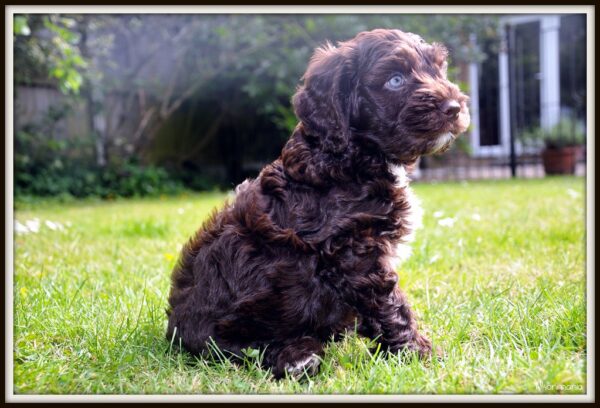As a loving Cockapoo owner, you’re likely well aware of the joy these fluffy companions bring. But it’s also crucial to stay vigilant about their health, particularly their eyes. Cockapoos, with their endearing button eyes, can be prone to certain eye problems.
In this article, I’ll be your guide to identifying common eye issues in your Cockapoo. We’ll delve into symptoms to watch out for, effective treatments, and preventative measures. Because when it comes to your Cockapoo’s health, knowledge is the first step to keeping those puppy dog eyes bright and healthy.
Symptoms of Cockapoo eye problems
Recognizing symptoms early is crucial in managing Cockapoo eye issues. Here’s a rundown of what you should be looking out for.
Excessive Tearing or Discharge
Cockapoos may naturally have some moisture around their eyes; however, easy-to-spot signs of eye problems can include intense tearing or abnormal discharge. Pay particular attention to any yellowish or greenish discharge.
Redness or Inflammation
If your Cockapoo’s eyes are frequently red and inflamed, it’s not something to be ignored. This can indicate several eye issues from infections to allergies or even more severe conditions such as cherry eye.
Squinting or Blinking
Squinting or excessive blinking can be telling signs that your dog is trying to clear something out of its eye or alleviate irritation. If this symptom persists or if you notice your dog is doing it more often, it should not be taken lightly.
Cloudiness or Change in Eye Color
A healthy dog’s eye should be clear. Spotting areas of cloudiness or changes in eye color may indicate more serious issues such as cataracts, glaucoma, or corneal ulcers.
Behavioural Changes
Subtle behavioral changes like decreased playfulness, reluctance to go out in bright light, bumping into things can indicate vision changes. They may not be clear signs of eye issues but warrant a vet visit nonetheless.
By keeping an eye out for these signs and symptoms, you’ll be equipped to spot potential eye problems early. I’ll dive more into the specific conditions causing these symptoms, their treatment, and prevention measures in the next sections. So, stay tuned for that.
Remember: timely detection is key to preventing permanent eye damage. Always consult a vet if you see any unusual signs in your Cockapoo’s eyes.

Common eye problems in Cockapoos
As we delve deeper into the potential threats to your Cockapoo’s eye health, it’s important to know about specific conditions. These run the gamut from common to severe. Knowledge is the first step in prevention and timely treatment.
One general condition Cockapoos are often susceptible to is Conjunctivitis, also known as pink eye. It’s an inflammation of the conjunctiva, the clear tissue covering the white part of the eye and the inner side of the eyelid. Cockapoos get it due to exposure to irritants like dust and wind, or through bacterial or viral infections. Symptoms include redness, excessive blinking, and discharge.
Cataracts represent another common issue. They cause cloudiness in the lens of the eye, obstructing light and leading to vision loss over time. Cockapoos are among the dog breeds genetically predisposed to developing cataracts. If you spot a change in eye color or a cloudy appearance, consult your vet immediately.
Progressive Retinal Atrophy (PRA) is a more serious genetic eye condition in Cockapoos. Simply said, it’s a group of degenerative diseases that affect the retina, ultimately leading to blindness. Unfortunately, at the time of writing, there’s no treatment. Early symptoms include difficulty seeing at night or in low light.
Finally, another one is Dry Eye or Keratoconjunctivitis Sicca (KCS). It’s a condition where the dog’s eyes don’t produce enough tears, leading to dryness and irritation. Frequently blinking and thick, yellowish discharge are common signs.
Now that I’ve covered common eye conditions in Cockapoos, you are armed with knowledge. In the next section, we’ll address various treatments available, plus prevention measures to keep your furry friend’s eyes healthy! Remember, early detection and intervention are key.
How to identify common eye issues in your Cockapoo
As a cockapoo parent, it’s essential to have an understanding of the key markers associated with these common eye problems. Early identification often helps in successful treatment or management of the condition. Let’s delve into how you can identify these issues.
The first condition we discussed, conjunctivitis also known as pink eye, can be quite noticeable. Look for signs of inflammation around the eye such as redness, swelling, or any kind of abnormal discharge. It’s also common for your Cockapoo to constantly rub the affected eye.
As for cataracts, you might notice cloudiness or white spots in your dog’s eyes. This condition can affect one or both eyes. It may start as a small, barely noticeable speck and gradually grow in size. This would be the time to seek veterinary attention.
Switching to Progressive Retinal Atrophy (PRA), a hereditary disease, it’s a bit trickier. PRA is characterized by the slow and painless degeneration of the retina leading to vision loss. Symptoms could include night blindness and difficulty navigating. Unfortunately, by the time these symptoms arise, the damage is already significant.
Lastly, when examining for Dry Eye or Keratoconjunctivitis Sicca (KCS), watch for signs of chronic redness, mucus discharge, squinting, or frequent blinking. Your Cockapoo’s eyes might look dull, instead of having the usual bright and shiny appearance.
Mitigation of these conditions starts with regular check-ups, ensuring your Cockapoo leads a healthy lifestyle, and good genetic breeding practices. Learn to note any abnormal behavior or appearance, and you’ll be better equipped to catch any eye issues early on. Keep in mind, however, that this information serves to guide you – any concerns you have about your pet’s health should always be discussed with a professional vet.
Effective treatments for Cockapoo eye problems
Now that we’ve identified the main eye problems that afflict Cockapoos, let’s delve into the available treatments. Armed with this knowledge, you’ll be more prepared to help your furry friend should they ever face these issues.
When it comes to conjunctivitis, it’s typically treated with topical antibiotics prescribed by a vet. Depending on the severity, some cases may require anti-inflammatory medication. Keep in mind each case is unique and should be treated based on your vet’s expert advice.
Cataracts pose a bigger challenge. They can sometimes be managed with medication to slow down the progression – but more severe cases will likely require surgery. This operation involves removing the clouded lens and replacing it with a synthetic one. Although sound intimidating, cataract surgery is quite common and has a high success rate. It’s best performed by a veterinary ophthalmologist, so you might need to consult a specialist.
Dry eye or KCS treatment attempts to increase tear production and improve the quality of tears. Your vet may recommend artificial teardrops and ointments. In severe cases, surgery can reroute the duct from the salivary gland to the eye to keep it moist. But this is typically a last resort.
Sadly, there’s currently no effective treatment for Progressive Retinal Atrophy (PRA) as it’s a genetically inherited disorder. Researchers are continuously working on potential cures. For now, regular trips to the vet, good eye care, and a healthy diet can mitigate the impact of PRA.
Let’s not forget that prevention often trumps cure. Regular check-ups, a healthy lifestyle catering to your Cockapoo’s needs, and ensuring good genetic breeding practices go a long way in preventing these conditions. Stay vigilant about your Cockapoo’s health and consult a vet at any sign of trouble.

Preventative measures to keep your Cockapoo’s eyes healthy
While understanding the common eye problems in Cockapoos is essential, it’s equally important to recognize preventive measures. You need to take steps towards keeping your pet’s sight strong and its eyes free from disease.
As I’ve mentioned before, check-ups play a critical role in maintaining your Cockapoo’s eye health. Regular appointments allow the vet to catch potential problems early on, often before your pet shows any symptoms. Generally, it’s advised to schedule an eye exam at least once per year. However, due to the Cockapoo’s predisposition to certain eye conditions, a biannual exam might be a better choice.
Having a balanced diet is another crucial element to consider. As with humans, the right nutrition can significantly affect your pet’s eye health. Ensure the diet includes antioxidants like beta-carotene and vitamins C and E. Omega-3 fatty acids, lutein, and zeaxanthin are also beneficial. Including these in your Cockapoo’s diet helps not only keep its eyes healthy but also contributes to its overall well-being.
Keep a close eye on your pet’s physical environment as well. Sharp objects can accidentally poke and injure their sensitive eyes. By providing a safe, clutter-free space, you protect your Cockapoo from potential eye accidents.
Another factor to consider is the importance of knowing your pup’s genetic history. Certain eye disorders like PRA are inherited. If your Cockapoo comes from family lines prone to such issues, it might be at higher risk. That’s where the value of good breeding practices comes in.
Lastly, don’t ignore grooming. Without proper eye care, your Cockapoo could suffer from issues like dry eyes and conjunctivitis. Make it a habit to check and clean your pup’s eyes regularly, and trim the hair around them if needed to prevent irritation.
It’s also important to know when to consult a vet. If you notice any changes in your pet’s sight or behavior, consult a professional immediately. Timely interventions can be key when dealing with eye disorders.
While these steps won’t guarantee your Cockapoo will never experience an eye problem, they can drastically reduce the risk. By following these guidelines, you’re on the right track towards ensuring your pet’s long-term eye health.
Conclusion
Eye health is paramount for your Cockapoo’s overall wellbeing. Being aware of potential eye problems like conjunctivitis, cataracts, PRA, and dry eye can make all the difference in early detection and treatment. Remember, some conditions have no cure, like PRA, but with regular vet check-ups and proper eye care, you can manage their impact. Treatments for other conditions range from topical antibiotics to surgery, depending on severity.
Prevention is always better than cure, so keep up with regular vet visits, maintain a healthy diet for your pet, and ensure a safe environment. Proper grooming and understanding your Cockapoo’s genetic history are also key. Always consult your vet with any health concerns. By following these steps, you’re paving the way for your Cockapoo’s long-term eye health.
Lise Horvath is a dedicated canine enthusiast and the passionate author behind CockapooMom.com, a trusted resource for Cockapoo owners seeking reliable information on caring for their beloved furry companions. With years of hands-on experience in canine behavior and nutrition, Lise brings a wealth of expertise to her writing, ensuring that CockapooMom.com offers authoritative guidance on topics ranging from training and health to lifestyle and nutrition.
Driven by her genuine love for Cockapoos and a commitment to promoting their well-being, Lise meticulously researches and curates content that reflects the latest industry standards and best practices. Her comprehensive articles are backed by reputable sources and tailored to address the unique needs of Cockapoo dogs, earning CockapooMom.com a reputation as a go-to resource for discerning pet parents.
Lise's dedication to transparency and accuracy is evident in her meticulous approach to content creation, prioritizing the dissemination of trustworthy information that empowers Cockapoo owners to make informed decisions about their pets' care. Through CockapooMom.com, Lise aims to foster a supportive community of dog lovers while upholding the highest standards of expertise, authoritativeness, and trustworthiness in the realm of canine care.
Connect with Lise and join the CockapooMom.com community to embark on a fulfilling journey of companionship and care with your Cockapoo companion.


